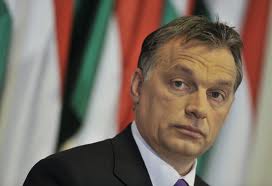To understand Fidesz is to understand Viktor Orbán.
Orbán is an exceptionally competent and charismatic leader who has molded the party in his own image.
Everybody who has attained any degree of power within Fidesz has totally internalized Orbán’s ideas, objectives, logic, manner and speech. Nothing they do or say deviates from that which Orbán expects of them in either explicit or implicit terms. Their every act, phrase and gesture is orchestrated to meet with his approval.
To understand Fidesz is to understand a man who grew up fighting for his dignity on the fringes of Hungarian village society during the communist era—a tough and unforgiving social milieu within a tough and unforgiving political system.
It is to understand a man who never grew tall (he is officially 174 centimeters in height, or 5-foot 8), though compensated for his lack of physical stature through toughness and aggression that manifested itself primarily on the football pitch, where he excelled as hard-driving forward for several organized clubs in his late teens and early twenties.
It is to understand a man who has cultivated the high intelligence, fortitude and effectiveness of speech needed to survive and thrive as a smallish rural kid at his high school in the city of Székesfehérvár and then in college at the Loránd Eötvös University School of Law and Political Sciences in Budapest.
Orbán has extended his fight to gain personal stature and dignity to a fight on behalf of the entire Hungarian people to attain what he considers to be its rightful place among nations. Back at the time when he and his fellow law-school students founded Fidesz in 1988, Orbán believed that this fight entailed winning independence from the Soviet Union, casting off the burden of communism and making Hungary part of the liberal-democratic, capitalist West.
Over the next twenty years he became deeply offended by what he viewed as Western exploitation and humiliation of the Hungarian people. He also become convinced that the West had become irremediably decadent and was on the verge of catastrophic collapse.
Since becoming prime minister again 2010, he has waged his fight on behalf of the Hungarian people against predatory Western corporations and culture, compelling him to turn Hungary back toward the east, toward China, Russia, the central Asian republics and the Arab states—countries with which he thinks he can do business without the threat of interference of any kind.
Orbán believes that he must have complete control over Hungary’s political system in order to implement this transition back away from Western free-market liberal democracy to Eastern guided economy and political authoritarianism. He will do anything within the law to hold on to power or regain it if he loses it.
Orbán sees any internal opposition as a threat to this unity and therefore as harmful to the interests of the Hungarian nation.
He rules according to the logic of a tribal chieftain, not to that of a modern European statesman. Always fighting, always struggling, driven by an extremely unwarranted Hungarian inferiority complex to engage in perpetual confrontation with oppressors both real and imagined.
This combativeness has put Orbán and Fidesz at continuous odds with the European Union and most of the Western world.
Hungarians have experienced this phenomenon before: political leaders, parties and ideologies that claim the right to unchallenged political authority on the grounds that it is needed to ward off the enemies of the nation or of a particular favored class within the nation.
It has never come to a good end. Always conflict and disorder and the need to break with the past and start afresh.
But perhaps this time it will succeed. If Orbán is correct in his assessment that the West has entered a period of devastating cultural, economic and political decline and that the future lies in the East and Eastern centralized economy and government, then he will go down in history as a visionary and courageous leader who pointed Hungary in the right direction before it was too late.
If he is wrong—if the shift in global power from the United States and Europe toward China and the East does not entail the catastrophic collapse of the West and the Western way of politics and economy—then he will go down in history as a leader who misunderstood the course of world events and led Hungary down the wrong path—once again.
—————————————————————————————————————————————–


